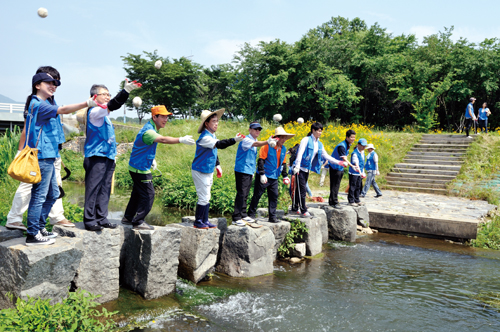Corp. also takes action to remove sludge from streams that cause bad odor through use of microorganism balls

Staff of Korea Environment Corp.(KECO) throw black balls mixed with sand, lactic acids,
fermented yeast and molasses into streams to improve the quality of water and
eliminate odors on June 12 on the occasion of Environment Month.(photo on courtesy of KECO)
Korea Environment Corp. (KECO) held a meeting on June 10 for its 46 executives and department managers led by President Lee Si-jin in the large conference room to swear to clean up unfair and corrupt practices at KECO, the company said.
The ceremony was designed to create the right environment for the realization of the new government’s governing philosophy and major tasks to establish disciplines for public servants and a clean administration to provide fair and transparent environmental administrative services to the people.
They also held a meeting on June 14 regarding the effective use of microorganisms to make balls mixed with sand and lactic acid, fermented yeast, and molasses to be thrown into streams to improve the water quality and eliminate bad smells over the course of around six months. One black ball can clean one square meter of area in the streams. KEC held a ceremony to throw the black balls into the 12 large streams around the country on June 14 in recognition of Environment Month.
The company held the realization ceremony for clean practices in April 2012 and made a pledge to kick off drives to clean up corrupt practices when the new CEO was inaugurated, the company said.
Included in the pledge statement were the joint possession of the new government’s ruling philosophy; establishment of disciplines; the creation of a clean culture; the rooting out of all kinds of corruption such as favors and breaking company rules for money; the elimination of outside interference in company matters; the fair and transparent execution of company business; and becoming a model for office manners, the company said.
In detail, the contents include jointly possessing the government’s ruling philosophy to open the age of the happiness and hope of the people by realizing an environmental administration; ridding the worksite of unethical practices such as slacking off at work, abusive language, and sexual harassment; the creation of a corporate culture that wins the public’s respect by realizing a clean government; rooting out unfair practices such as doing favors for or asking favors of others in the office that prevents the fair undertaking of company work and transparent office practices. The company will focus on ridding itself of all kinds of corrupt acts at all units of the company by sticking to the contents of the pledge through large campaigns in order to get the trust and love from the people as a leading company in the area of removing corrupt practices.
President Lee said he will see to it that each officer voluntarily does his or her best to stick to the pledge’s contents, especially in regards to unfair and corrupt practices, and the company will further push the cleanliness success projects jointly with the National Human Rights Committee to ensure that the clean corporate culture takes deep root in the company.
Pursuant to Article 4 and Article 12 of the United Nations Framework Convention on Climate Change (UNFCCC), an international environmental treaty effectuated in 1994, Korea is required to draw up an inventory that accounts for the nationwide greenhouse gas emissions and absorption on a yearly basis, of which KECO is responsible for calculating the greenhouse gas emissions from wastes and drawing up the report on it.
Greenhouse Gas Emission Trading is the greenhouse gas reduction system prescribed in Article 17 under the Kyoto Protocol. This assigns the authority (emission right) to emit greenhouse gas between parties and allows ‘Emission Trading (ET)’ to induce them to reduce gas emissions. In this spirit, KECO performs the role of the operating organization for the Greenhouse Gas Emission Trading Pilot Project led and supervised by the Ministry of the Environment, which began in Jan. 2010.
